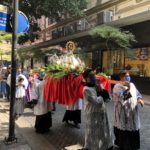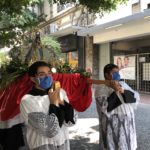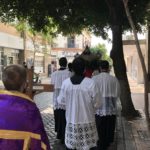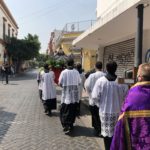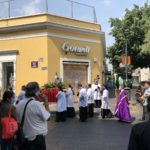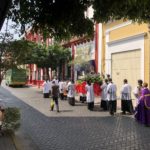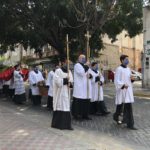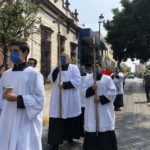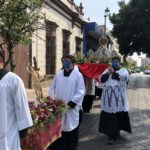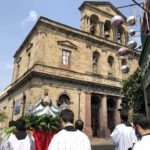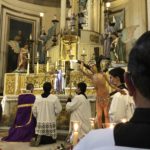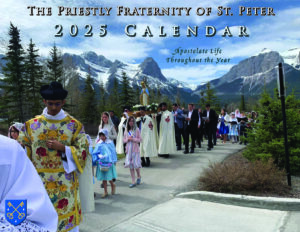Battling the Pandemic in Mexico
by Fr. Daniel Heenan, Pastor, FSSP Guadalajara, Mexico

Across the globe, society and the Church are struggling to cope with a global pandemic on a scale which has not been seen for a long time. Whatever opinions one might have regarding the appropriateness or severity of the responses taken in different places, there is no doubt that this situation has had tremendous effects in all spheres of life. Certainly the Church has had to adapt to very unusual circumstances in order to continue her mission at the service of souls. We will not soon forget Holy Week of 2020 when most places celebrated the Easter Triduum under difficult restrictions and in the absence of the faithful. Although in Mexico the situation has not yet become as grave as in the United States, here too we have had to cope with frustrating realities.
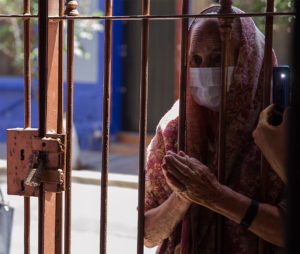
To date the official infection and mortality rates are still much lower than they are in the United States. Nevertheless, what happens in the United States invariably has its effect south of the border. In most places in Mexico, stay-at-home orders are still voluntary for most people. In Guadalajara, they just recently began to order the closing of non-essential businesses. The Church in some places, understanding how important the Faith is for the fabric of society, has tried to avoid closures. In Guadalajara we were first instructed that there would be two weeks without public Masses. Later that order was extended for another month and most are now expecting that the situation will continue at least until the end of May. Thanks be to God, the decrees have insisted that the churches shall remain open.
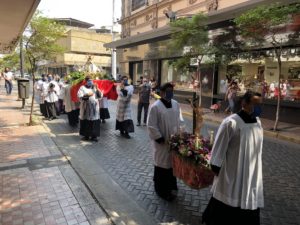
The fear is that the effects of a full-fledged pandemic in Mexico could be catastrophic. All admit that the Mexican healthcare system is woefully inadequate. The majority of people are on a government insurance program that is notorious for delays, poor quality of services, inadequate facilities and equipment, and unsanitary conditions in the public hospitals. Just the other day I met with a woman who was scheduled for an emergency heart surgery but had her appointment postponed two months because all the resources are being reserved for COVID-19 patients.
Economically the consequences will likely be disastrous. A large portion of the population live on what they are able to earn each day working in informal business such as roadside food stands. For them the option to stop working simply does not exist. At Casa Cristo Rey in recent weeks we have seen an increased number of people knocking at the door asking for work. They bring their small children with them because the schools have been closed and beg not only for food but also the most basic sanitary items. In our parish, San Pedro en Cadenas, many of our parishioners have responded generously and provided donations of food and other necessities that we have been able to deliver. On the other hand, others of our parishioners are likewise being severely impacted economically.
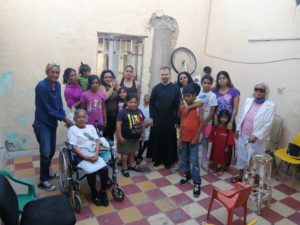
We visited several homeless shelters and an orphanage with these gifts and the directors confessed how much in need they are because their normal donations have not been arriving (probably due to a combination of fear and economic shortfalls). At one such shelter we met a family of seven that live in a single apartment that is only about four feet by five feet with one mattress. They live in a building with thirty other families in similar conditions. Upon entering the building, one immediately notices that there are no face masks and no anti-bacterial gel. The place is filthy. The roof of the building is incomplete. Most of the people don’t even have shoes. One gets the impression that in these places it is very hard to worry about catching a virus because life is already simply a struggle to survive.
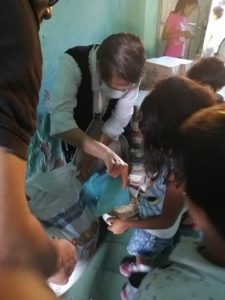
Our arrival with the food delivery was greeted with great joy. First we gave lollipops to the children which they received with exuberance. That was not surprising. What was astonishing is that when we began to divide the bags of oatmeal, the children were equally overjoyed. It was painfully evident that material poverty was not their only ailment. I began to ask the children who could tell me what Easter was. No one knew. I asked them if they knew who Jesus was. There were a few responses, but mostly silence. I tried to lead them in a few basic prayers. A few of them knew a little bit, but no one could recite them in their entirety. I then asked the parents if their children attended catechism, and they all bashfully avoided making eye contact.
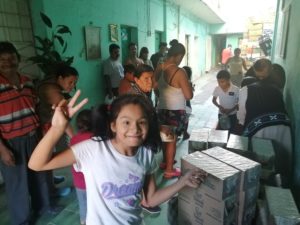
Here in Mexico and in many other places in the world, the coronavirus is going to generate an enormous humanitarian crisis that comes on top of one that really already exists. Feeding the spiritual hunger is even more urgent. This is a need that in many places has sadly not been filled and the current crisis will only exacerbate the problem. We have continued offering confessions, and the lines have been very long. Many who came were not parishioners, but came because they could not find any other place to confess their sins. The Church is trying to urge people to stay connected to Mass and catechesis through social media, but technology is not a feasible answer for many people who live in poverty. At one house we visited to deliver food I suggested to the family to follow the Triduum on our Facebook page. They had to admit that most of the time they didn’t have enough money to buy data on their phones and they certainly did not have WiFi in their house. In that moment it dawned on me what an enormous challenge the Church has to not lose contact with these people during this time of quarantine. This is especially important considering that the news media is eager to report that various Protestant groups are making house visits and tending to the material needs of the people.
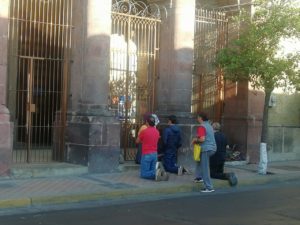
There is not an easy answer to these problems, and, sadly, the root causes of weakening faith go back well before the appearance of the coronavirus. We cannot simply throw caution to the wind, especially because there is a grave possibility that the consequences of pandemic in poorer parts of the world can be far worse than what has been witnessed in more developed countries. There is no doubt that this pandemic has caused and will continue to cause widespread suffering. I pray that in the midst of our hardships we do not forget that some people will be hit much harder. We can hope that these trials will provide an impetus for spiritual renewal as we look for ways to continue to preach Christ, especially to those most in need of reasons to hope. When one comes face to face with people whose existence is already quite fragile, one cannot help but realize that, while health and material needs are no doubt important, what is of greatest value is that which is capable of giving meaning to life in spite of whatever hardships one has to endure. +
April 23, 2020


